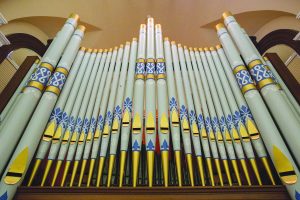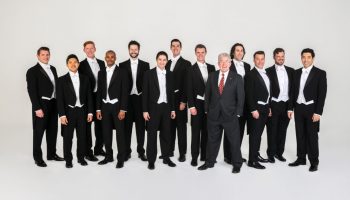
Because she was a woman composer in the late 19th century, Frances “Fanny” Crosby was forced to publish her music using more than 400 pen names.
Using pseudonyms like “Hope Tryaway” and “John Sterling,” Crosby authored around 8,000 hymns and gospel songs.
“She was one of the best hymn-writers of her generation — we understand that now,” said Jared Jacobsen, Chautauqua’s organist and coordinator of worship and sacred music. “(Crosby) was also blind, so people thought, ‘How can she be any good? She’s a woman and she’s blind.’ ”
At 12:15 p.m. today, July 2, in the Hall of Christ, Jacobsen will feature work from Crosby and other composers during the Tallman Tracker Organ recital, “ ‘Sing them over again to me…’: A Hymn Sampler.” This concert will be a sing-along with a setlist of traditional American hymns.
“Often I’ll find a line out of a hymn that sticks in the back of my head, and it becomes the theme for something,” Jacobsen said. “So the concert’s going to be a sing-along with the audience, and I’m acutely aware that people come to organ recitals who may not be from the same religious tradition that I am.”
But Jacobsen said he thinks people will understand that he chose this program’s music because the Tallman Organ was designed to play songs like those in today’s setlist.
“It was designed to help people sing things,” he said.
The hymn “Onward Christian Soldiers,” arranged by organist Samuel Brenton Whitney, is a piece Jacobsen said he found through Michael’s Music Service.
“(Michael’s Music Service) are two guys in North Carolina that seek out forgotten pieces of organ music and republish them,” he said. “They enlist the help of people like me, who might’ve found something at a flea market or a garage sale that other people might like to know about. I send stuff over, and they republish it.”
The arrangement by Whitney is a variation on the original hymn that, according to Jacobsen, “gives you a window into how someone breaks down a tune and plays with it.”
Rounding out the program is “The Royal Telephone” by Frederick Martin Lehman, hymn writer and founder of Nazarene Publishing House.
“I was trying to do a hymn program, but I wanted something with a sort of goofy twist on it,” Jacobsen said. “It’s a parody hymn about ‘The Royal Telephone’ — ‘royal’ meaning ‘the telephone of Jesus.’ ”
According to Jacobsen, parodies like “The Royal Telephone” are both songs that kids might sing at camp, and the kinds of songs that are sung at Chautauqua.
“It wasn’t all heavy-duty education here,” he said. “People cut loose here. From the very beginning, Chautauqua was the craziest place you can imagine.”





